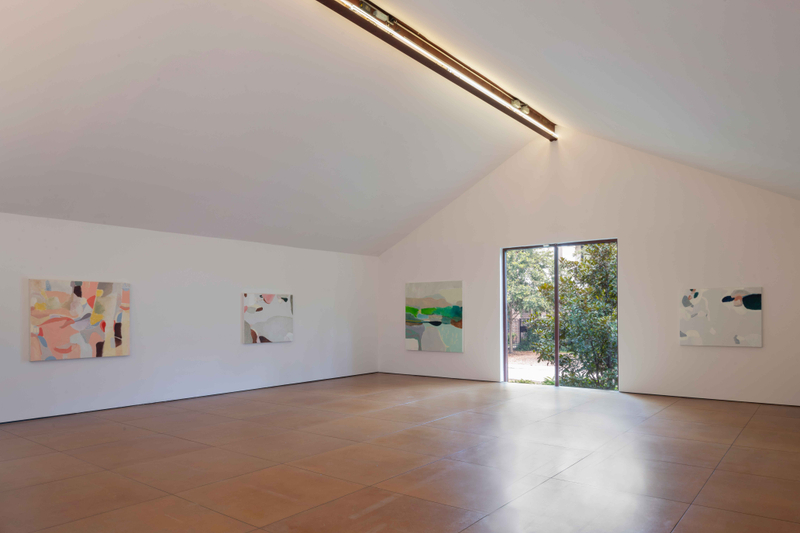Review:"Terrell James: Time and Tide"at Josh Pazda Hiram Butler Gallery
There is a room on the second floor of the San Antonio Museum of Art showcasing one of the strongest collections of Modern and Contemporary Art in Texas. It is here that I first encountered a painting by Terrell James. I’ve since visited the museum regularly with a particular interest in this collection and often find James’ painting, The Game (2015), on view alongside others by Dorothy Hood, Marcelyn McNeil, Helen Frankenthaler, Forrest Bess, Richard Diebenkorn, and Liz Trosper. It’s an effective curation that simultaneously places James within relevant historical and contemporary contexts. This is especially true of James’ connections to Hood, a longtime friend and mentor, and Bess, whose work James was deeply involved with while employed at the Archives of American Art during the 1980s.

Terrell James, “The Game,” 2015, acrylic on canvas, 66 x 66 inches. Collection of the San Antonio Museum of Art
While The Game features a signature style that James has developed throughout her career — including poetic references to landscapes and various geological and organic forms that are often abstracted beyond immediate recognition — Time and Tide, a new exhibition of paintings from 2022-2024 at Josh Pazda Hiram Butler Gallery in Houston, sees the artist exploring these themes more directly. Take Insomnia’s Green Ledge (2022), with its titular form leading the eye from the bottom left corner toward a set of boulders that drop into a river bend, jutting up against the tree line before concluding into a distant pale earth and gray sky. It is an explicit reference to form that lacks precedent in James’ body of work.

Terrell James, “Insomnia’s Green Ledge,” 2022, oil on canvas, 66 x 66 inches. Photo: Josh Pazda Hiram Butler Gallery

Terrell James, “Peninsula,” 2023, oil on canvas, 42 x 42 inches. Photo: Josh Pazda Hiram Butler Gallery
Peninsula (2023) features a similarly titular landscape, this time seen in an aerial view. Whereas Insomnia’s Green Ledge reads as an exploration of color, an interest of James’ reflected in her longstanding Field Studies series, Peninsula explores the passage of time and its effects on the physical and metaphysical worlds. Here we see the artist’s palette limited to varying shades of blues and browns, helping to create a focused sense of motion in the composition that suggests subtle dramas about crashing waves and erosion. Groundswell (2023) helps contextualize these explorations of the exterior world within James’ larger body of work. The composition clearly references a landscape with its shapes and colors alluding to plant life, bodies of water, and mounds of earth — all grounded by a distinct and central horizon. However, the painting gives way to a certain uneasiness. Groundswell is familiar yet otherworldly, inviting you to reflect on fading memories and uncertain futures while maintaining its ethereal beauty.

Terrell James, “Groundswell,” 2023, oil on linen, 58 x 48 inches. Photo: Josh Pazda Hiram Butler Gallery
This evocation of internal processes is more clearly expressed in other works on view in the exhibition. For example, Tide (2024) juxtaposes an abstracted underwater seascape with the visceral qualities of flesh and bone in what becomes a doubly immersive depiction of being and perceiving. A figure in the top left corner is reminiscent of the spinal cord as it merges with another form that may be the liver or some other vital organ. A seashell also seems to emerge nearby, floating delicately above a reef-like structure in liminal space. Just as a poet uses the precise combination of a few words to elicit deep introspection, James’ measured use of color and form reflects the human experience at both microscopic and cosmic scales.

Terrell James, “Tide,” 2024, oil on linen, 40 x 50 inches. Photo: Josh Pazda Hiram Butler Gallery
While James’ paintings have previously contained similar depictions of remarkably intimate interior worlds, there is a directness, openness, and lightness to the space in these new works that suggests an expanded dialogue between the artist and her environment. During a recent presentation at the Modern Art Museum of Fort Worth, James fielded a question about whether she experiences “painter’s block.” The artist responded in the negative, sharing that decades of working has created a “built-in vocabulary and beginning process.” However, she did note that after the end of an exhibition, there is often a period to “process and learn” from a new body of work. Given that James has recently mounted several major exhibitions, including Terrain (2021), a monumental 100ft painting exhibited at Cadogan Gallery in London, and One Eye Sees, The Other Feels, a solo exhibition at the Mobile Museum of Art which is the artists largest to date, it’s unsurprising that such revelatory developments have found their way into James’ most recent work.
Terrell James: Time and Tide is on view at Josh Pazda Hiram Butler Gallery through Saturday, June 29.

